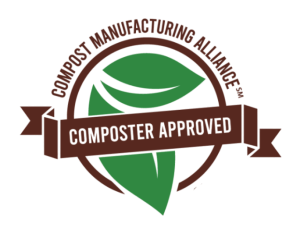Compost Manufacturing Alliance
Certification and Acceptance Requirements
CMA “certification” denotes that the product has demonstrated compliance with applicable ASTM standards, has demonstrated total fluorine <100 ppm by a closed-vessel preparation method, and has demonstrated adequate disintegration in a commercial compost facility (>80% for fiber-based products and >90% for biopolymers).
CMA “acceptance” denotes the product has demonstrated compliance with the “Substrate Review” requirements set out below. CMA “acceptance” is not a certification.
Eligible Product Categories
Products for certification must be related to yard waste or food service, food packaging or food disposal items. Products, including those above or those which do not meet the food and yard waste requirements, may be certified for closed loop systems or take-back program qualification only.
Documentation Required
All products must be submitted with CMA’s Compostability Profile, including the PFAS Addendum, and the CMA Contract of Engagement.
All products submitted to CMA for certification or acceptance must provide laboratory analysis showing <100 ppm total fluorine (not an ASTM requirement) pursuant to a closed digestion method by a CMA approved laboratory.
Other documentation as required by category below.
ASTM Standards referenced below are available at:
- https://www.astm.org/Standards/D6868.htm
- https://www.astm.org/Standards/D6400.htm
Definitions
Fiber-based products: Product containing at least one layer predominantly made with a plant fiber (e.g., tree, bagasse, bamboo, palm leaf, wheat chaff, corn stover, rice hulls).
Field testing: Placement of items in a commercial composting facility under normal operating conditions.
Disintegration: Breakdown of material based upon visual inspection of pre- and post-composting surface area
Field Testing
These categories require field testing.
Molded fiber
- Laboratory confirmation that the product contains <100 ppm total fluorine.
- Items must meet ASTM D6400 or EN 13432 standards. ASTM laboratory results must include heavy metals analysis, spectral analysis, phytoxicity analysis, and biodegradation.
- Field testing. Item must disintegrate by >80% when placed in a commercial composting process under normal operating conditions.
Biopolymers
- Laboratory confirmation that the product contains <100 ppm total fluorine.
- Items must meet ASTM D6400 or EN 13432 standards for bioplastics, co-polymers, or meet ASTM D6868 for PLA coated paperboard and paper, and other similar items. ASTM laboratory results must include heavy metals analysis, spectral analysis, phytoxicity analysis, and biodegradation.
- Field testing. Item must disintegrate by >90%.
Multilayered coated substrate (non-paper)
- Passing results under ASTM D6868.
- Lab confirmation that items contain <100ppm total fluorine.
- Field testing. Item must disintegrate by >90%.
Multilayered coated paper
- Passing results under ASTM D6868.
- Lab confirmation that items contain <100ppm total fluorine.
- Field testing disintegration >80%.
- Coated papers with less than 80% disintegration may be eligible for conditional acceptance where there is complete breakdown of coating as demonstrated by post-composting dye test.
Single uncoated substrate with additives >1%
- Passing results under ASTM D6868.
- Lab confirmation that items contain <100ppm total fluorine.
- Field disintegration of >90%.
Novel Substrates (Not otherwise covered by a listed category)
- Passing results under ASTM D6868, ASTM D6400 or other applicable ASTM.
- If no ASTM standard applies, comparable laboratory testing for heavy metals, phytotoxicity, spectral analysis and biodegradation.
- Lab confirmation that items contain <100ppm total fluorine.
Substrate Review
(Not Eligible for Certification)
The following categories are eligible for substrate review and do not require field testing.
Uncoated and untreated (no additives) fiber-based products
- Lab confirmation that the product contains <100ppm total fluorine.
- Food-related products submitted for substrate review must provide documentation of compliance with 21 CFR 170-199.
- Material safety data sheets and heavy metals analysis for inks.
- Physical inspection of the product by CMA.
Wax coated papers
- Lab confirmation that the product contains <100ppm total fluorine.
- Food-related products submitted for substrate review must provide documentation of compliance with 21 CFR 170-199.
- Technical wax requirements
- The wax is <40 carbon chain (MW less than 500 fits as 40 carbons is 480),
- The wax is not microcrystalline
- The wax is linear (not branched, no unsaturation)
- No other treatments or coatings are used
- Physical inspection of the product by CMA.
Clay coated papers
Temporary acceptance standard which is in effect until reasonable and feasible alternatives are commercially available.
-
- Lab confirmation that the product contains <100ppm total fluorine.
- Food-related products submitted for substrate review must provide documentation of compliance with 21 CFR 170-199.
- No other coatings or additives are used.
- Material safety data sheets and heavy metals analysis for ink.
- Physical inspection of the product by CMA.
Paper Produce Stickers
Temporary acceptance standard which is in effect until reasonable and feasible alternatives are commercially available.
- Lab confirmation that the product contains <100ppm total fluorine.
- Food-related products submitted for substrate review must provide documentation of compliance with 21 CFR 170-199.
- Material safety data sheets and heavy metals analysis for inks.
- Material safety data sheets for adhesives.
Physical inspection of the product by CMA.
Product Marking and Use of the CMA Logo
CMA encourages, but does not mandate, use of color, labeling or marking as a certification requirement. CMA certification does not imply compliance with any jurisdictional requirements regarding coloring, labeling or other marking.
Use of the CMA logo is voluntary and requires a separate license and license fee.
The manufacturer is responsible for ensuring compliance with all applicable laws.
